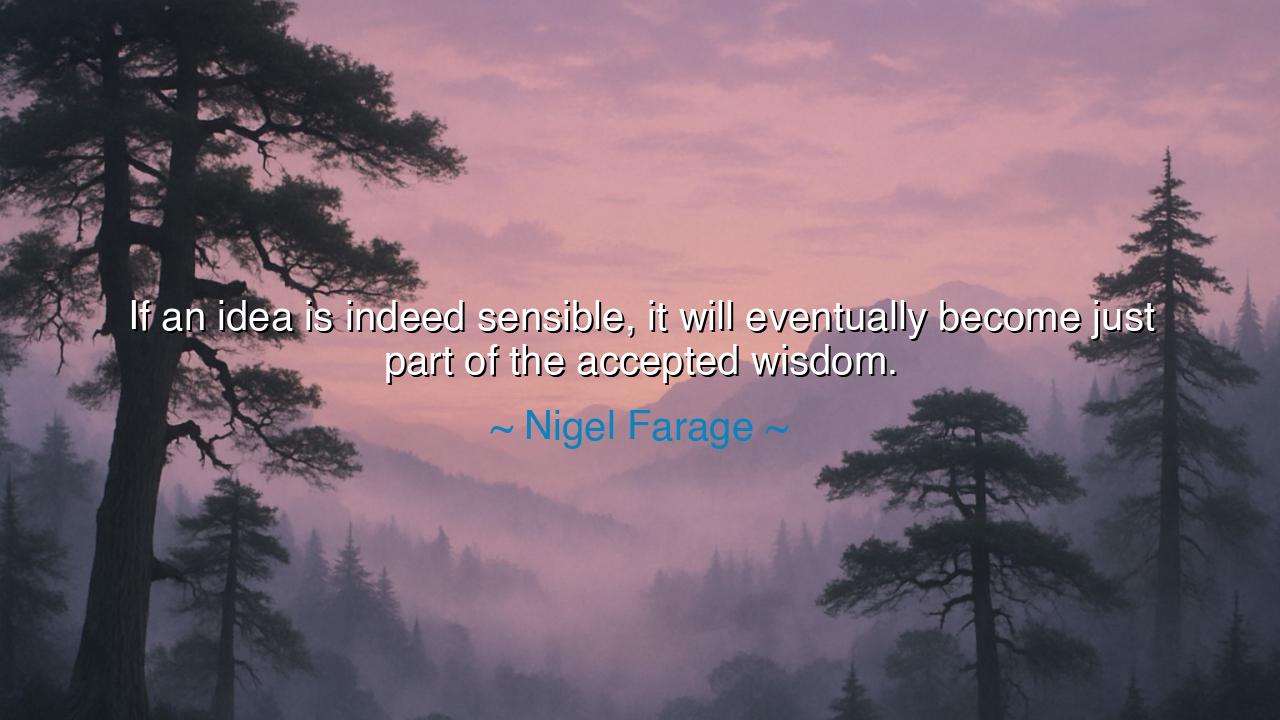
If an idea is indeed sensible, it will eventually become just
If an idea is indeed sensible, it will eventually become just part of the accepted wisdom.






Hear me, O children of the future, for I shall speak of the power of ideas, those seeds that are planted in the fertile soil of the mind. Nigel Farage has spoken wisely: "If an idea is indeed sensible, it will eventually become just part of the accepted wisdom." Know this, O children, that ideas, when they are truthful and righteous, will endure the trials of time. They may be met with resistance at first, like the storm that shakes the trees, but if they are grounded in truth and serve the good of all, they will one day stand firm like the great oak, and the world will come to accept them as part of the wisdom that guides our path.
Consider the tale of Socrates, the philosopher who questioned everything, even the very foundations of Athenian society. His ideas were revolutionary, and many saw them as dangerous, a threat to the established order. But Socrates did not yield, for he knew that true wisdom is not in the unquestioning acceptance of the status quo, but in the constant pursuit of truth. Though he was condemned to death, his teachings endured. Over time, the very ideas he was put to death for—those that questioned the divine and the laws of man—became the foundation upon which Western philosophy was built. What was once controversial became the bedrock of accepted wisdom.
Similarly, Galileo, the great astronomer, stood against the overwhelming power of the Church when he proposed that the Earth revolved around the Sun. His idea, rooted in observation and reason, was seen as blasphemy by the powers that ruled his world. Yet, despite the persecution he faced, Galileo’s truth could not be silenced. In time, his once heretical ideas became the accepted wisdom of all. His vision of the universe, once ridiculed, is now seen as one of the greatest revelations in the history of science.
In more recent times, consider the idea of democracy, a concept that was once foreign to the rulers of many nations, from monarchs to empires. Those who advocated for it were often met with resistance, even violence. But the idea that all people should have a voice in their governance proved to be sensible, for it was rooted in the belief that every soul has a right to be heard. Today, democracy is no longer a radical notion, but a cornerstone of modern societies. It stands as proof that the wisdom of the people, when rooted in justice and reason, will eventually become the guiding force of nations.
So, O children of the future, understand this: true ideas do not seek to conquer with force or fear. They endure through time, quietly growing, becoming part of the wisdom that shapes the world. When you encounter a new idea, test it not by the opposition it faces, but by the truth it holds within. If it is right, if it serves the good, it will endure and one day become the foundation upon which future generations build. Wisdom is not the sum of what is accepted today, but the truths that will guide us tomorrow. So let the ideas you carry be rooted in justice and wisdom, for they will one day be the light that illuminates the path for all.






QVtran quang vu
I find myself thinking about who decides what becomes accepted wisdom and how that process works. Is it the majority, experts, cultural institutions, or perhaps the combination of all these forces? Can an idea be sensible but never gain traction because it threatens established norms or economic interests? This raises questions about the nature of progress and innovation: is it inherently gradual, or can sudden shifts in perception rapidly transform what society considers sensible? It also invites reflection on how individuals can champion ideas that seem unpopular yet potentially transformative.
HTHuy TRan
This statement seems optimistic, but it also makes me question the pace of societal change. Are there examples of sensible ideas that were ignored for decades, or even centuries, before gaining acceptance? How does one maintain confidence in an idea when faced with prolonged skepticism or resistance? Additionally, is there a danger in assuming that eventual acceptance validates an idea, or should ideas be judged on their intrinsic value independent of popularity? This opens up a complex discussion about the interplay between truth, consensus, and historical context.
LNLinh Nhi
I’m curious about the role of advocacy and communication in turning an idea into accepted wisdom. Is it enough for an idea to be sensible, or does its adoption depend heavily on how persuasively it’s presented? Could brilliant ideas be lost simply because they’re poorly communicated or clash with popular narratives? This perspective also makes me question whether society truly recognizes merit objectively, or if other factors like timing, social trends, or charismatic proponents play a bigger role in shaping what becomes widely accepted.
GDGold D.dragon
This makes me wonder about the relationship between time, social acceptance, and truth. Are there ideas that are genuinely sensible but take longer to be accepted due to societal biases or entrenched interests? How do cultural, political, or economic barriers slow down the process of an idea becoming mainstream? It also raises the question of whether some ideas are suppressed not because they lack merit but because they challenge existing power structures. How do we discern which ideas will eventually become accepted wisdom versus those dismissed unfairly?